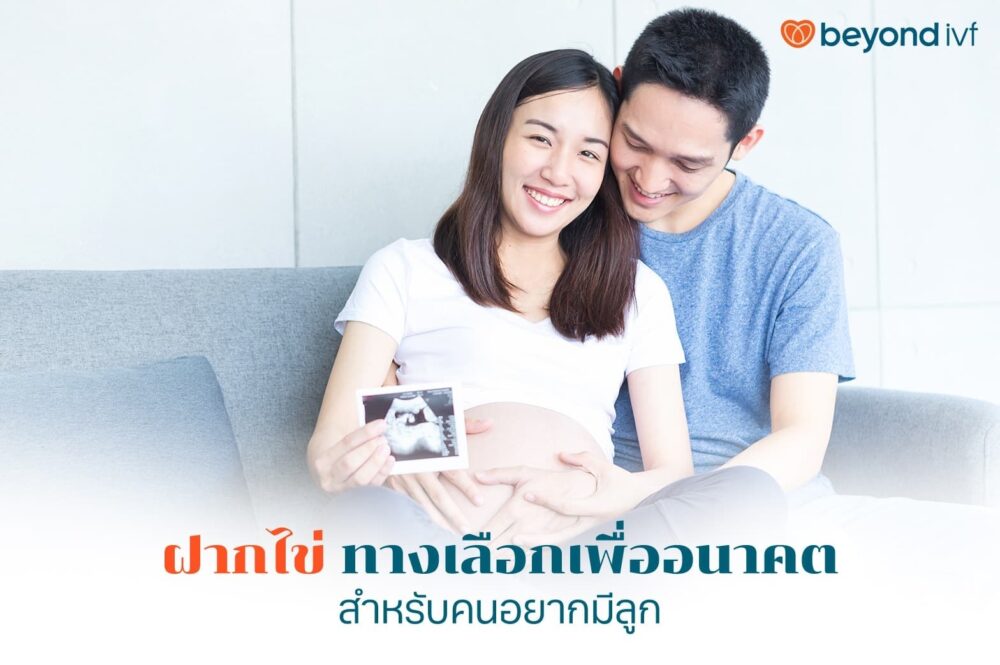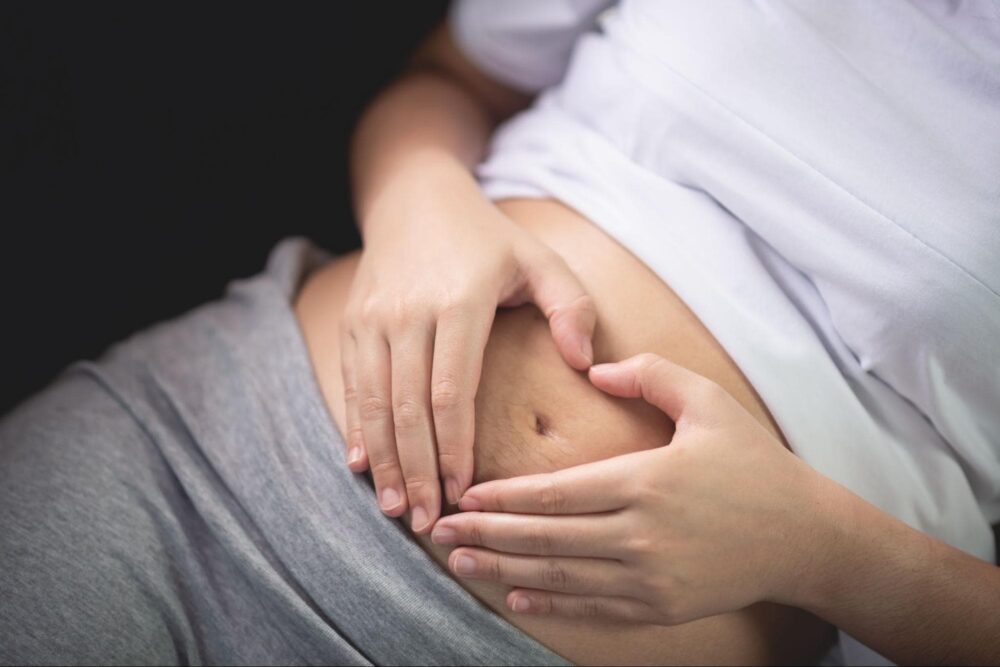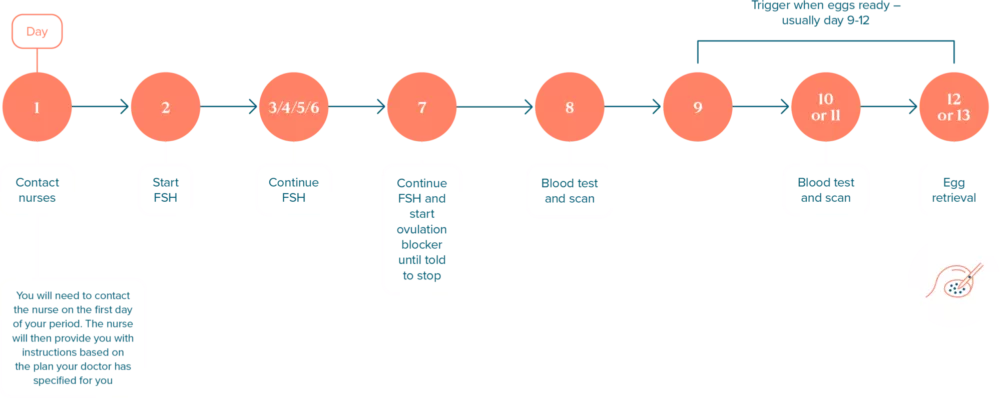
การตั้งครรภ์บุตรอาจไม่ใช่เรื่องง่ายสำหรับทุกคน โดยเฉพาะในยุคที่หลายคนแต่งงานช้าลงหรือมีปัญหาเกี่ยวกับภาวะเจริญพันธุ์ การฝากไข่ (Egg Freezing หรือ Oocyte Cryopreservation) จึงกลายเป็นอีกหนึ่งทางเลือกสำคัญสำหรับผู้ที่ต้องการวางแผนตั้งครรภ์ในอนาคต ไม่ว่าจะด้วยเหตุผลด้านสุขภาพหรือความพร้อมในชีวิต
ในปัจจุบัน วิธีฝากไข่มีการพัฒนาให้ปลอดภัยและสามารถเก็บรักษาเซลล์ไข่ไว้ได้ในสภาพแวดล้อมที่เหมาะสม เราจึงจะพาไปทำความเข้าใจเกี่ยวกับการฝากไข่ ตั้งแต่ขั้นตอนการเตรียมตัวฝากไข่จนถึงการดูแลหลังการเก็บไข่ เพื่อช่วยให้คุณตัดสินใจได้ในการวางแผนมีบุตรในอนาคต
ฝากไข่ คือ เทคโนโลยีในการแช่แข็งเซลล์ไข่
การฝากไข่ (Egg Freezing หรือ Oocyte Cryopreservation) คือ เทคนิคทางการแพทย์ที่ใช้เทคโนโลยีในการแช่แข็งเซลล์ไข่ (Oocyte) เพื่อเก็บรักษาไว้ใช้ในอนาคต โดยเซลล์ไข่ที่สุกและแข็งแรงจะถูกดูดออกมาจากรังไข่ภายหลังการกระตุ้นไข่ (Ovarian Stimulation) ด้วยฮอร์โมน จากนั้นจะนำเอาไปแช่แข็งในอุณหภูมิประมาณ -196°C ด้วยวิธี Vitrification ซึ่งเป็นเทคนิคที่ลดความเสียหายของเซลล์จากผลึกน้ำแข็ง
ขั้นตอนฝากไข่จะช่วยให้ผู้หญิงสามารถเก็บเซลล์ไข่ของตนไว้ใช้ในช่วงเวลาที่พร้อมต่อการตั้งครรภ์ ไม่ว่าจะเป็นกรณีที่ยังไม่พร้อมมีบุตร หรืออยู่ระหว่างการวางแผนชีวิตในระยะยาว การฝากไข่จึงเป็นอีกหนึ่งทางเลือกสำคัญสำหรับผู้ที่กำลังวางแผนเตรียมตั้งครรภ์ในอนาคต และมีบทบาทสำคัญในกลุ่มผู้ที่กำลังเผชิญภาวะเจริญพันธุ์เสื่อมลง
ทำไมผู้หญิงถึงควรฝากไข่?

หลายคนอาจยังไม่ทราบว่าอายุมีผลต่อคุณภาพของไข่มากกว่าที่คิด ยิ่งอายุเพิ่มมากขึ้นโอกาสในการตั้งครรภ์ตามธรรมชาติก็ยิ่งลดน้อยลง การวางแผนไว้ล่วงหน้าจึงเป็นเรื่องสำคัญ ฉะนั้น การฝากไข่จะช่วยให้สามารถเก็บเซลล์ไข่ไว้ในช่วงที่ยังแข็งแรงและสมบูรณ์ก่อนที่รังไข่จะเริ่มเสื่อมตามวัย โดยเฉพาะผู้หญิงอายุ 35 ปีขึ้นไปที่ต้องการมีลูกในอนาคตหรือยังไม่พร้อมมีบุตรในช่วงเวลานี้ เหมาะกับทั้งคนที่ต้องการวางแผนชีวิตระยะยาว หรือผู้ที่อยู่ระหว่างการรักษาภาวะมีบุตรยาก เช่น การทำเด็กหลอดแก้ว (IVF) ดังนั้น ฝากไข่จึงไม่ใช่แค่เรื่องของการเก็บไข่ แต่เป็นการเก็บโอกาสไว้ให้ตัวเองในวันที่พร้อมที่สุด
(New) Header Tag 2 : การเตรียมตัวก่อนฝากไข่
ก่อนเข้าสู่วิธีการฝากไข่ ผู้หญิงควรเตรียมร่างกายและจิตใจให้พร้อม เพื่อให้สามารถเก็บไข่ที่มีคุณภาพดีที่สุดออกมาได้ การดูแลตัวเองอย่างเหมาะสมในช่วงนี้มีผลต่อผลลัพธ์ในระยะยาว โดยวิธีเตรียมตัวก่อนฝากไข่มีดังนี้
- ปรับพฤติกรรมการกิน
เลือกรับประทานอาหารที่มีโปรตีนสูง เช่น ไข่ เนื้อปลา ถั่วเมล็ดแห้ง ลดน้ำตาล แป้งขัดขาว และอาหารแปรรูป เพื่อช่วยปรับสมดุลฮอร์โมนและสนับสนุนการทำงานของรังไข่ (Ovarian Function)
- บำรุงด้วยวิตามินที่จำเป็น
ทานอาหารเสริมที่ช่วยบำรุงเซลล์ไข่ เช่น Coenzyme Q10, Astaxanthin, Methyl Folate, Vitamin D และ Inositol โดยควรปรึกษาแพทย์ก่อนเริ่มรับประทานเพื่อให้เหมาะสมกับสภาพร่างกายแต่ละบุคคล
- พักผ่อนให้เพียงพอและจัดการความเครียด
การนอนหลับที่มีคุณภาพส่งผลต่อการทำงานของระบบสืบพันธุ์อย่างมาก และช่วยลดความแปรปรวนของฮอร์โมน อีกทั้งความเครียดเรื้อรังอาจส่งผลให้การตอบสนองต่อการกระตุ้นไข่ลดลง
- ออกไปสูดอากาศและรับแสงแดดอ่อน ๆ ในยามเช้า
การรับแสงแดดธรรมชาติในช่วงเช้าประมาณ 20–30 นาที ช่วยกระตุ้นการผลิตวิตามินดี (Vitamin D) ซึ่งมีหน้าที่สำคัญในการส่งเสริมคุณภาพเซลล์ไข่ และช่วยปรับสมดุลฮอร์โมนในร่างกาย นอกจากนี้ การออกไปสูดอากาศบริสุทธิ์ยังช่วยให้จิตใจผ่อนคลาย ส่งผลดีต่อระบบการทำงานของร่างกายโดยรวม
- งดสูบบุหรี่และดื่มแอลกอฮอล์
เนื่องจากสารที่มีอยู่ในบุหรี่และเครื่องดื่มแอลกอฮอล์เหล่านี้จะส่งผลโดยตรงต่อคุณภาพของไข่และลดโอกาสการฝังตัวของตัวอ่อน
- ตรวจร่างกายก่อนเริ่มฝากไข่
เข้าพบแพทย์เพื่อประเมินระดับฮอร์โมน เช่น AMH (Anti-Mullerian Hormone), FSH (Follicle-Stimulating Hormone) และตรวจภายในอื่น ๆ ที่จำเป็น รวมถึงคู่สมรสอาจต้องเข้ารับการตรวจอสุจิ (Semen Analysis) หากมีแผนทำเด็กหลอดแก้วในอนาคต
- ปรึกษาแพทย์เพื่อวางแผนการฝากไข่
แพทย์จะให้คำแนะนำในทุกขั้นตอน รวมถึงประเมินเวลาที่เหมาะสมกับร่างกายของแต่ละคน เพื่อให้การเริ่มต้นของการฝากไข่เป็นไปอย่างราบรื่นและปลอดภัย
ขั้นตอนการฝากไข่มีอะไรบ้าง?

วิธีการฝากไข่มีขั้นตอนที่ต้องทำอย่างเป็นระบบ เพื่อให้สามารถเก็บไข่ที่มีคุณภาพดีที่สุดออกมาได้ ทั้งยังช่วยเพิ่มโอกาสสำเร็จในการปฏิสนธิในอนาคต โดยขั้นตอนการฝากไข่มีขั้นตอนหลัก ๆ อยู่ด้วยกัน 5 วิธี ดังนี้
1. ตรวจร่างกายและประเมินฮอร์โมน
เมื่อประจำเดือนมาวันที่ 2-3 แพทย์จะทำการตรวจร่างกายและเจาะเลือดเพื่อประเมินค่าฮอร์โมนที่เกี่ยวข้อง เช่น AMH (Anti-Mullerian Hormone) รวมถึงตรวจโรคติดเชื้อพื้นฐาน นอกจากนี้ยังมีการตรวจอัลตราซาวนด์ภายใน (Transvaginal Ultrasound) เพื่อประเมินจำนวนฟอลลิเคิลในรังไข่ ทั้งหมดนี้เป็นการเตรียมความพร้อมก่อนเริ่มขั้นตอนการเก็บไข่
2. กระตุ้นรังไข่ด้วยฮอร์โมน
เมื่อตรวจร่างกายและประเมินฮอร์โมนเป็นที่เรียบร้อย แพทย์จะเริ่มฉีดยากระตุ้นรังไข่ (Ovarian Stimulation) ด้วยยาเช่น Gonal-F, Follitropin alfa หรือ Menopur ซึ่งจะช่วยให้ไข่เติบโตหลายใบในรอบเดือนเดียว พร้อมกับฉีดยาป้องกันไข่ตกก่อนเวลา เช่น Cetrotide หรือ Orgalutran ระยะเวลากระตุ้นไข่อยู่ที่ประมาณ 8-10 วัน โดยจะมีการติดตามขนาดไข่ผ่านอัลตราซาวนด์เป็นระยะ
3. ติดตามขนาดไข่และฉีดยาให้ไข่ตก
เมื่อฟอลลิเคิล (follicle) มีขนาดถึงเกณฑ์ แพทย์จะฉีดยาเพื่อกระตุ้นให้ไข่สุกเต็มที่ เช่น Ovidrel หรือ hCG จากนั้นจะนัดวัน ขั้นตอนการเก็บไข่ ซึ่งต้องดำเนินการภายใน 34-36 ชั่วโมงหลังฉีดยา เพื่อให้ได้ไข่ที่พร้อมที่สุดสำหรับนำไปแช่แข็งหรือทำ IVF ในอนาคต
4. เข้าสู่ขั้นตอนการเก็บไข่
ในวันเก็บไข่ ผู้เข้ารับการฝากไข่จะได้รับยาระงับความรู้สึก จากนั้นแพทย์จะใช้เข็มดูดไข่ออกจากฟอลลิเคิลผ่านทางช่องคลอด โดยอาศัยการนำทางด้วยอัลตราซาวนด์ การเก็บไข่ (Egg Retrieval) ใช้เวลาประมาณ 30 นาที และควรพักฟื้นอย่างน้อย 1-2 ชั่วโมงหลังทำหัตถการ ทั้งนี้ แนะนำให้งดน้ำงดอาหารล่วงหน้า 8 ชั่วโมง และเตรียมตัวตามคำแนะนำของแพทย์ก่อนเข้าสู่ขั้นตอนการเก็บไข่
5. แช่แข็งไข่และเก็บรักษา
ไข่ที่ได้จะถูกตรวจคุณภาพเบื้องต้น ก่อนนำไปแช่แข็งด้วยเทคนิค Vitrification ซึ่งเป็นวิธีแช่แข็งแบบรวดเร็วเพื่อลดการเกิดผลึกน้ำแข็งที่อาจทำลายเซลล์ ไข่จะถูกเก็บไว้ในไนโตรเจนเหลวที่อุณหภูมิประมาณ -196°C จนกว่าจะมีการนำมาใช้ในการปฏิสนธิ (Fertilization) เช่น การทำเด็กหลอดแก้ว (IVF) เมื่อเจ้าของไข่พร้อมวางแผนตั้งครรภ์ในอนาคต
วิธีดูแลตัวเองหลังฝากไข่
หลังจากผ่านขั้นตอนฝากไข่ ร่างกายอาจมีการเปลี่ยนแปลงเล็กน้อย ซึ่งควรมีการดูแลตัวเองอย่างเหมาะสม เพื่อช่วยให้ร่างกายฟื้นตัวได้ไวและลดความเสี่ยงของภาวะแทรกซ้อนที่อาจเกิดขึ้นได้ โดยมีวิธีการดูแลตนเองเบื้องต้น ดังนี้
- พักผ่อนให้เพียงพอ หลังการเก็บไข่ควรหยุดพักอย่างน้อย 1–2 วัน เพื่อให้ร่างกายได้ฟื้นตัวเต็มที่ หากมีอาการอ่อนเพลีย หรือปวดหน่วงบริเวณท้องน้อย ควรนอนหลับให้เพียงพอและหลีกเลี่ยงกิจกรรมที่ใช้แรงมาก
- หลีกเลี่ยงการออกกำลังกายหนัก ควรงดการออกกำลังกายแบบคาร์ดิโอ ยกเวต หรือกิจกรรมที่มีแรงกระแทกสูงเป็นเวลา 1 สัปดาห์หลัง ฝากไข่ เพื่อป้องกันภาวะรังไข่บิดตัว (Ovarian Torsion)
- สังเกตอาการผิดปกติ ถ้าหากมีไข้ขึ้นสูง ปวดท้องรุนแรง มีเลือดออกมาก หรือมีตกขาวผิดปกติ ควรรีบพบแพทย์ทันที เนื่องจากอาจเป็นสัญญาณของภาวะแทรกซ้อน เช่น ติดเชื้อ หรือภาวะรังไข่ถูกกระตุ้นมากเกินไป (Ovarian Hyperstimulation Syndrome)
- เลือกรับประทานอาหารที่เหมาะสม เน้นอาหารที่มีโปรตีนสูงและย่อยง่าย เช่น ปลา ไข่ เต้าหู้ รวมถึงผักและผลไม้สด งดอาหารหมักดอง ของมัน ของทอด และควรดื่มน้ำสะอาดอย่างน้อยวันละ 1.5–2 ลิตร เพื่อช่วยลดการบวมน้ำและฟื้นตัวเร็วขึ้นหลังฝากไข่
- งดเพศสัมพันธ์ในช่วงแรก ควรงดมีเพศสัมพันธ์อย่างน้อย 7 วันหลังการเก็บไข่ เพื่อหลีกเลี่ยงความเสี่ยงของการติดเชื้อหรือการบาดเจ็บภายในช่องท้อง
อยากฝากไข่ เริ่มยังไงดี?
เมื่อคุณพร้อมที่จะสร้างครอบครัวในอนาคต ไข่ที่แช่แข็งไว้จะถูกนำมาละลาย เพื่อเข้าสู่กระบวนการทำเด็กหลอดแก้ว ซึ่งประกอบด้วยการปฏิสนธิโดยการฉีดอสุจิเข้าไปในไข่โดยตรง (ICSI) การเพาะเลี้ยงตัวอ่อน การย้ายตัวอ่อนกลับสู่โพรงมดลูก และหากมีตัวอ่อนที่สมบูรณ์เหลืออยู่ ก็จะนำไปแช่แข็งเพื่อใช้ในครั้งต่อไป
ก่อนฝากไข่โปรดทราบว่าแม้ในกลุ่มอายุที่อายุน้อย (ต่ำกว่า 37 ปี) ก็ต้องทำความเข้าใจว่า ไม่ไข่ทั้งหมดอาจรอดจากกระบวนการแช่แข็งและละลาย นอกจากนี้ ไข่ที่ละลายแล้วบางส่วนอาจไม่ฟักตัวหรือพัฒนาไปถึงระยะตัวอ่อน อีกทั้งตัวอ่อนที่ย้ายไปยังมดลูกอาจไม่ได้ทำให้เกิดการตั้งครรภ์ได้เสมอไป แต่คุณสามารถมั่นใจได้ว่า ทีมงานของเราพร้อมจะทุ่มเทความรู้ความสามารถและเทคโนโลยีที่ดีที่สุด เพื่อให้คุณมีโอกาสประสบความสำเร็จมากที่สุด
ที่นี่เราจะพาคุณไปสำรวจตัวเลือกต่าง ๆ เพื่อให้คุณสามารถค้นหาสิ่งที่เหมาะสมกับคุณ…
เมื่อไรคือเวลาที่เหมาะสมสำหรับการเข้าสู่ขั้นตอนการฝากไข่? เวลาที่เหมาะสมในการพยายามมีลูกขึ้นอยู่กับสถานการณ์เฉพาะของคุณ มันเป็นการตัดสินใจที่เป็นส่วนตัวอย่างยิ่ง คุณอาจเป็นคนโสด มีคู่รัก หรืออยู่ในความสัมพันธ์แบบ LGBTQ+ หากคุณยังไม่พร้อมที่จะมีลูกในตอนนี้ การแช่แข็งไข่อาจเป็นตัวเลือกที่ช่วยรักษาภาวะเจริญพันธุ์ของคุณ
การเริ่มต้นไม่ยาก เพื่อเริ่มต้น เราขอแนะนำให้คุณนัดหมายกับแพทย์ด้านภาวะมีบุตรยาก ในการปรึกษาครั้งนี้ คุณจะได้รับการอธิบายถึงทางเลือกต่าง ๆ และจัดทำแผนเบื้องต้น และการประเมินภาวะเจริญพันธุ์ของคุณ
หากคุณต้องการพูดคุยอย่างไม่เป็นทางการเพื่อสำรวจตัวเลือกของคุณ สามารถนัดหมายกับพยาบาลที่มีประสบการณ์ด้านภาวะมีบุตรยากของเราได้
ระยะเวลาโดยทั่วไปสำหรับการแช่ฝากไข่

โดยทั่วไปการฝากไข่จะใช้เวลาประมาณ 12–14 วัน นับจากวันแรกของรอบเดือนจนถึงวันเก็บไข่ ขั้นตอนต่าง ๆ ถูกวางแผนอย่างเป็นระบบ โดยมีทีมแพทย์และพยาบาลคอยดูแลอย่างใกล้ชิดในแต่ละช่วงเวลา
- วันที่ 1 ผู้เข้ารับการฝากไข่ ต้องติดต่อคลินิกทันทีเมื่อมีประจำเดือนวันแรก เพื่อแจ้งเริ่มวิธีการฝากไข่ ซึ่งพยาบาลจะให้คำแนะนำตามแผนที่แพทย์กำหนดไว้เฉพาะบุคคล
- วันที่ 2 เริ่มฉีดยา FSH (Follicle-Stimulating Hormone) เพื่อกระตุ้นรังไข่ให้ผลิตไข่มากกว่าปกติในรอบเดือนนั้น
- วันที่ 3–6 ดำเนินการฉีด FSH อย่างต่อเนื่องทุกวัน พร้อมเฝ้าติดตามอาการตามคำแนะนำของแพทย์
- วันที่ 7 ยังคงฉีด FSH และเริ่มใช้ยายับยั้งการตกไข่ก่อนเวลา (Ovulation Blocker) เพื่อควบคุมไม่ให้ไข่ตกเองตามธรรมชาติ
- วันที่ 8–9 ทำการตรวจเลือดและอัลตราซาวนด์ (Scan) เพื่อติดตามการเจริญเติบโตของไข่ หากไข่มีขนาดและจำนวนที่เหมาะสมแล้ว จะได้รับยาฉีดกระตุ้นให้ไข่ตกในเวลาที่กำหนด
- วันที่ 10–11 ตรวจติดตามอีกรอบ เพื่อประเมินความพร้อมก่อนวันเก็บไข่
- วันที่ 12 หรือ 13 เข้าขั้นตอนการเก็บไข่ (Egg Retrieval) โดยแพทย์จะใช้เข็มดูดไข่ออกมาภายใต้การดมยาสลบเล็กน้อย ใช้เวลาเพียง 30 นาที และพักฟื้นหลังทำไม่นาน
คำถามทั่วไปเกี่ยวกับการฝากไข่
เวลาที่เหมาะสมคือเมื่อไหร่?
ช่วงเวลาที่เหมาะสมในการวางแผนมีบุตรนั้นขึ้นอยู่กับสถานการณ์เฉพาะของแต่ละคน เพราะเป็นการตัดสินใจที่ต้องอาศัยทั้งความพร้อมทางร่างกายและจิตใจ ไม่ว่าคุณจะเป็นโสด แต่งงานแล้ว หรืออยู่ในความสัมพันธ์แบบ LGBTQI+ หากคุณยังไม่พร้อมจะมีลูกในตอนนี้ การเลือกฝากไข่อาจเป็นทางเลือกที่ช่วยรักษาความสามารถในการมีบุตรไว้ในอนาคตได้
เพื่อให้คุณสามารถวางแผนได้อย่างมั่นใจ แนะนำให้เข้ารับบริการตรวจภาวะมีบุตรยากฟรี ที่โรงพยาบาล ซึ่งจะช่วยประเมินภาวะเจริญพันธุ์เบื้องต้น พร้อมรับคำแนะนำจากแพทย์โดยตรงว่าเวลานี้เหมาะกับการตั้งครรภ์ หรือควรเริ่มต้นการฝากไข่ไว้ก่อนดี
โอกาสในการตั้งครรภ์โดยใช้สเปิร์ม ไข่ หรือ ตัวอ่อนที่เก็บรักษาไว้เป็นอย่างไร?
โอกาสในการตั้งครรภ์จากการใช้สเปิร์ม ไข่ หรือ ตัวอ่อนที่เก็บรักษาไว้ ขึ้นอยู่กับคุณภาพของเซลล์และช่วงอายุในขณะทำการเก็บรักษา ถ้าหากใช้สเปิร์มแช่แข็งอัตราการตั้งครรภ์จะใกล้เคียงกับสเปิร์มสด ไม่ว่าจะทำ IUI หรือ IVF ส่วนตัวอ่อนแช่แข็งก็ให้ผลลัพธ์คล้ายกับตัวอ่อนสด โดยกว่า 95% ส่วนใหญ่จะรอดจากการแช่แข็งและละลาย อย่างไรก็ตาม การฝากไข่มีโอกาสที่ไข่บางฟองจะไม่รอดจากกระบวนการมากกว่าตัวอ่อน ซึ่งอัตราการอยู่รอดอาจแตกต่างกันตั้งแต่ 50% ถึงมากกว่า 90% แล้วแต่บุคคล
หากไข่สามารถรอดจากการแช่แข็งได้ ส่วนใหญ่จะสามารถพัฒนาเป็นตัวอ่อนได้ตามปกติ แม้บางฟองอาจมีพัฒนาการไม่สมบูรณ์ ปัจจัยสำคัญที่ส่งผลต่อโอกาสตั้งครรภ์คืออายุของผู้หญิงในช่วงที่ตัดสินใจทำวิธีฝากไข่ รวมถึงจำนวนไข่หรือตัวอ่อนที่มีอยู่ สำหรับผู้ที่สนใจทำ ฝากไข่ หลายรอบ Beyond IVF ยังมีส่วนลดค่าบริการในรอบถัดไป เพื่อช่วยวางแผนอนาคตให้มั่นใจยิ่งขึ้น
การฝากไข่มีความเสี่ยงแค่ไหน?
การฝากไข่ ถือเป็นวิธีการทางการแพทย์ที่ค่อนข้างปลอดภัย แต่ก็มีโอกาสเกิดผลข้างเคียง เช่น ภาวะรังไข่ตอบสนองเกิน (Ovarian Hyperstimulation Syndrome) หรืออาการไม่รุนแรงอย่างปวดท้องหน่วง คลื่นไส้ หรืออารมณ์แปรปรวนจากฮอร์โมน หากมีการดูแลตัวเองตามคำแนะนำแพทย์ก็สามารถช่วยลดความเสี่ยงเหล่านี้ได้
การฝากไข่ราคาเท่าไหร่?
ค่าใช้จ่ายในการฝากไข่อาจแตกต่างกันตามแพ็กเกจและแพทย์ผู้ดูแล โดยที่ Beyond IVF มี โปรโมชั่นฝากไข่ให้เลือก 2 แบบ ได้แก่ แพ็กเกจของอาจารย์ต้น ราคาอยู่ที่ประมาณ 100,000 บาท ครอบคลุมทั้งค่ายา แช่แข็งไข่ 1 ปี และหัตถการทั้งหมด พร้อมผ่อน 0% ได้ 10 เดือน เดือนละ 10,000 บาท ส่วนแพ็กเกจของคุณหมอกิตติ ราคาเริ่มต้นประมาณ 79,000 บาท ผ่อนเดือนละ 7,900 บาท โดยทั้งสองแพ็กเกจไม่จำกัดจำนวนไข่ และไม่รวมค่าตรวจร่างกายก่อนเริ่มต้นการรักษา สำหรับผู้ที่สนใจราคาฝากไข่ที่คุ้มค่าและต้องการดูแลอย่างใกล้ชิด สามารถใช้สิทธิ์โปรโมชั่นฝากไข่ ได้เมื่อเข้ารับคำปรึกษาในช่วงโปรโมชั่นที่กำหนด
ฝากไข่ที่ Beyond IVF เรายินดีให้คำปรึกษา เพื่อช่วยคุณสำรวจทุกความเป็นไปได้
ฝากไข่ไม่ใช่แค่การเก็บรักษาเซลล์ไข่เท่านั้น แต่ยังเป็นการวางแผนเพื่ออนาคตของตัวเองและครอบครัวในวันที่พร้อมมีบุตรที่สุด อย่างที่ได้อธิบายไปแล้วว่าฝากไข่คืออะไร รวมถึงรายละเอียดของขั้นตอนการฝากไข่ทั้งหมดนี้ล้วนแสดงให้เห็นว่าการตัดสินใจเริ่มต้นตั้งแต่วันนี้อาจเป็นจุดเปลี่ยนสำคัญที่ช่วยเพิ่มโอกาสการมีบุตรในอนาคตและสร้างครอบครัวในแบบที่คุณตั้งใจไว้




